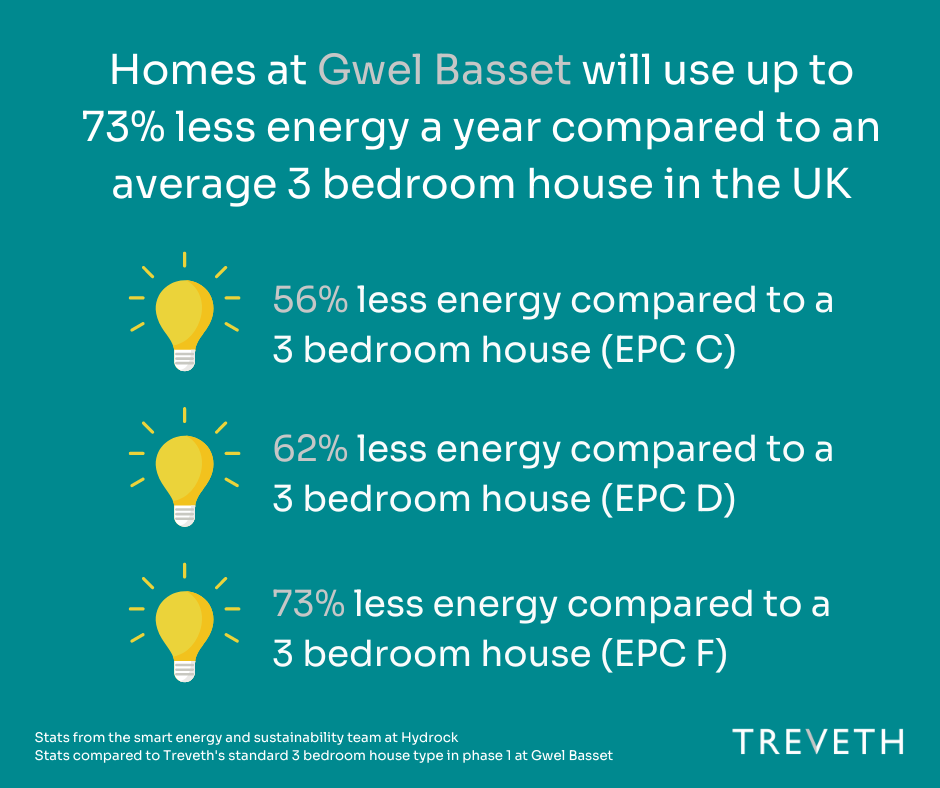Sustainability – 2030 climate challenge
Since its launch in 2019, Treveth has been building high-quality new build homes, sustainable communities, and commercial developments in partnership with Cornwall Council to benefit people who live and work in Cornwall.
Treveth is in full alignment with Cornwall Council’s ambition for Cornwall to be carbon neutral by 2030 and we are committed to achieving this as a business. Our primary purpose is to build schemes that enable our residents and tenants to enjoy affordable, low carbon lifestyles with little effort.
Net zero ready homes
In 2021, Treveth launched its first new homes scheme, Gwel Basset at Tolgus, Redruth. This is a market leading, low carbon estate housing scheme, with all 185 new build homes at this site designed to meet challenging operational energy saving targets set by the industry for 2030. All subsequent schemes are following this lead.
No fossil fuels
Since our inception, Treveth has not built any homes containing fossil fuelled boilers. Our new homes come with air source heat pumps as standard that capture and boost ambient heat from Cornwall’s mild climate. We have pledged to #EndGasNow.
Connected communities
Our new schemes are carefully integrated into existing communities through the inclusion of walking and cycling routes, as well as access to bus and rail infrastructure, that make it easier and more enjoyable to use alternative modes of travel. This can help reduce reliance on car use as well as support physical and mental health.

Edible landscapes
Across our sites, we are creating opportunities for our residents and tenants to come together through community food growing initiatives, with the provision of allotments as well as edible planting, such as native fruit and nut trees within landscaped areas.
Biodiversity net gain
We are equally committed to playing our part in tackling the ecological emergency and are committed to delivering at least 10% biodiversity net gain in all our new projects.

Strategic renewables
For our larger scale developments, we are in the process of developing alternative renewable strategies that take advantage of Cornwall’s natural geology to provide decarbonised heat. At Langarth Garden Village, it is intended that all of the planned 3,600 new homes will be heated through a district heating network linked to the United Downs Deep Geothermal Power Project. A similar district heat network, this time linked to ground source heat pumps, is planned for our Pydar Regeneration project. We are also actively looking at other opportunities to increase our provision of renewable electricity such as solar farms.
Local construction
It is vital that we also look at ways to reduce the carbon that is ‘embodied’ in the construction of our schemes, and we are already meeting challenging targets set for reducing this in our new homes by 2030. Working with local suppliers is one way in which we can reduce travel miles and key elements in our strategy include the use of timber frame construction and Cornish air-cured blocks made with secondary aggregate.
Carbon reduction
Whilst we are already showing industry leadership in how we are meeting 2030 targets with our homes, we are on a journey to being carbon neutral by 2030 and there is still much to do. We have now completed our first Carbon Baseline Report and Carbon Reduction Strategy, which will enable us to set measurable targets for further annual reductions.
Please click here for more information about our Carbon Baseline Report and Carbon Reduction Strategy.
We are actively developing a pipeline of opportunities, including working with our supply chain on the purchase of innovative low carbon materials and local ecologists on how we can capture carbon in our landscapes. Alongside our ambitious strategic renewable energy plans, these initiatives will lead to us being able to absorb carbon in our schemes and take us further on our decarbonisation journey.

